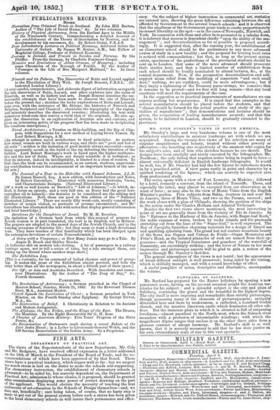FINE ARTS.
DEPARTMENT OF PRACTICAL ART.
The views of the Superintendents of the new Department, Mr. Cole and Mr. Redgrave, have received official expression in a letter addressed on the 10th of March to the President of the Board of Trade, and the re- commendations of which have been approved of by that Board. These views have a practical tendency, which argues well so far : but we suspect too much stress is laid on the desire to make the schools self-supporting. For elementary instruction, the establishment of elementary schools is advocated—to be aided by, but scarcely dependent on, the Department of Practical Art; admission to whose classes, it is proposed, should be granted after examination displaying some power of correct drawing on the part of the applicant. This would obviate the necessity of teaching the first rudiments of art-education in the Schools of Design themselves—and, we dare say, beneficially; care being taken, of course, that no hasty step is made to get out of the present system before such a status has been given to the local elementary schools as will insure their permanence and effici- ency. On the subject of higher instruction in ornamental art, statistics are entered into, showing the great difference subsisting between the aid afforded by Government to the several branch schools : and it is observed that the smallness of the Government grant tends to excite proportionately increased liberality on the spot—as in the cases of Newcastle, Norwich, and York. In connexion with these and other facts presented in a tabular form, it is inferred that success is dependent chiefly "upon the ability of the ma- nagement " ; and decentralization as far as possible is proposed accord- ingly. It is suggested that, after the ensuing year, the establishment of an elementary school should be the preliminary to any more advaneed course of study in a new locality ; and the proposal for levying local rates is noticed with commendation ; but that, so long as the present system exists, specimens of the productions of the provincial students should be sent up to London, that some of the more advanced should prosecute their studies here, and that a limited number of exhibitioners from each school should be locally nominated to attend lectures, er.e., at the central department. Now, if the prospective decentralization and self- support mean relief from the meddling of inspectors "and such small deer," nothing, we are confident, could be more advantageous ; but if they imply a tightening of the Treasury purse-strings, we conceive that it remains to be proved—and we fear will long remain—that any local exertions will meet the requirements of the ease.
In the suggestion as to practical improvements of manufactures we can express nothing but acquiescence. It is urged that fine examples in the several manufactures should be placed before the students, and that "classes should be formed for the actual practice and study of the spe- cialties of manufacture" ; that demonstrations and lectures should be given, the cooperation of leading manufacturers secured; and that this system, to be initiated in London, should be gradually extended to the provinces.


























 Previous page
Previous page